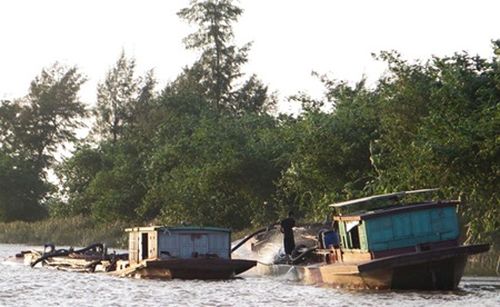A representative from PanNature suggested clearly defining the non-profit status of science and technology organizations to facilitate research, technology transfer, and application. This clarity would also enhance international collaboration and attract funding.

Mining destroys local way of life
The mining of minerals has caused serious harm to the public’s environment, experts warned.

A recent report presented at a workshop held by the People and Nature Centre (PanNature) and the Viet Nam Mining Coalition showed that mining activities is a direct cause of hunger and poverty in localities.
Mining activities have damaged society and the environment, affecting local communities the most, according to experts.
For instance, residents in the Trai Cau iron mining site in Thai Nguyen Province have been living with pollution, dust and noise for years. The open cast mine has been operating since 1969 using Chinese ore sifting technology.
About 200 households in Trai Cau Town now live in a dangerous area where the land could shift at any time.
However, Trai Cau is not the only one among numerous regions in the country that are affected by the mining of minerals.
Viet Nam houses more than 5,000 mining sites, containing more than 60 different minerals, as more than 1,100 enterprises are mining minerals.
Le Trinh, deputy head of Institute for Environmental Science and Development, said that coal mining has caused severe environmental pollution.
“To produce a tonne of coal, miners have to remove eight to 10cu.m of soil and discharge 1 to 3 cu.m of waste water. In just 2006, coal mines at Viet Nam Coal and Minerals Industries Corporation discharged into nature 182,6 million of cu.m of soil and about 70 million cu.m of waste water. Some regions in Quang Ninh Province were polluted at an alarming level, including Mao Khe, Uong Bi, Cam Pha,” he said.
According to the Ministry of Natural Resources and Environment, titanium mining in Binh Dinh Province is polluting the soil, water, air and destabilizes the lives of local people. Further, titanium mining causes chemical and radioactive pollution.
Trinh added that bauxite mining in the Central Highlands discharged a large amount of red mud which causes environmental pollution. He warns that when the lakes containing red mud at the bauxite sites erode and spill into streams and the Dong Nai River, the water source of 12 millions inhabitants will severely affect the health of local inhabitants.
The attitude of enterprises
According to Trinh, enterprises exploiting minerals should play an important role in protecting the environment.
Nguyen Ngoc Sinh, the President of the Viet Nam Association for Conservation of Nature and Environment, said the 2010 revised Mineral Law had stricter rules requesting enterprises to protect the environment. However, many mining companies have not been granted permission to conduct mining. Also, many of them use out-of-date equipment, which results in environmental pollution to surrounding areas.
According to Nguyen Viet Dung, deputy director from PanNature, projects in mineral exploitation are only registered in the name of associations and enterprises. Yet, the criminal law of Viet Nam only punishes individuals. He believes that when those enterprises are placed under the jurisdiction of criminal law, violations of the environment will be reduced.
Nguyen Xuan Ly, head of the Anti-Environmental Crimes Police Department, said that illegal exploitation, trade and export of minerals, which often occurs in the North Western region, Central Highlands and the Central region, caused a severe loss of minerals and natural resources. Also, the illegal exploitation and trade of sand and pebbles on large rivers have become an urgent matter.
Dang Hung Vo, former Deputy Minister of The Ministry of Natural Resources and Environment, said the Ministry should cooperate with local inhabitants to more closely supervise the activities of those enterprises and raise their awareness about environmental protection.
Source: VietnamNews



